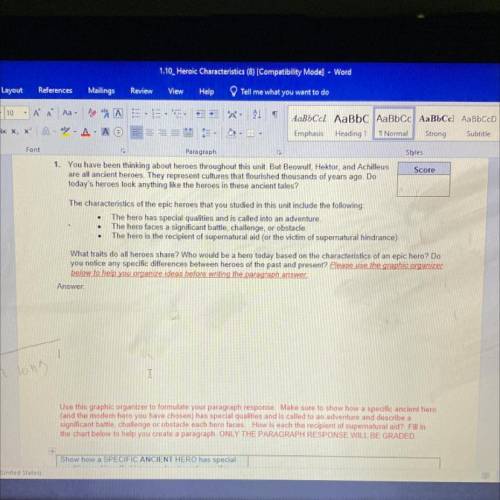
English, 18.10.2020 03:01 Sydney012618
1. You have been thinking about heroes throughout this unit. But Beowulf, Hektor, and Achilleus are all ancient heroes. They represent cultures that flourished thousands of years ago. Do today’s heroes look anything like the heroes in these ancient tales?
The characteristics of the epic heroes that you studied in this unit include the following:
• The hero has special qualities and is called into an adventure.
• The hero faces a significant battle, challenge, or obstacle.
• The hero is the recipient of supernatural aid (or the victim of supernatural hindrance).
What traits do all heroes share? Who would be a hero today based on the characteristics of an epic hero? Do you notice any specific differences between heroes of the past and present? Please use the graphic organizer below to help you organize ideas before writing the paragraph answer.
Show how a SPECIFIC ANCIENT HERO has special qualities and is called into an adventure. (name the hero, give examples)
Show a SPECIFIC ANCIENT HERO faces a significant battle, challenge, or obstacle. (name the hero, give examples)
Show how a SPECIFIC ANCIENT HERO is the recipient of supernatural aid or the victim of supernatural hindrance. (name the hero, give examples)
Show how a SPECIFIC MODERN HERO has special qualities and is called into an adventure. (name the hero, give examples)
Show a SPECIFIC MODERN HERO faces a significant battle, challenge, or obstacle. (name the hero, give examples)
Show how a SPECIFIC MODERN HERO is the recipient of supernatural aid or the victim of supernatural hindrance. (name the hero, give examples)


Answers: 2


Another question on English

English, 22.06.2019 01:40
Which work would represent a change to the artistic medium of this original work?
Answers: 2

English, 22.06.2019 03:00
Read the excerpt from the poem "growing up italian" by maria mazziotti gillan and answer the question that follows. when i was a little girl, i thought everyone was italian, and that was good. we visted our aunts and uncles, and they visted us. the italian language smooth and sweet in my mouth. in kindergarten, english words fell on me, thick and sharp as hail. i grew silent, the italian word balanced on the edge of my tongue and the english word, lost during the first moment of every question. source: gillan, maria mazziotti. "growing up italian." poetrymagazine.com. poetry magazine, n.d. web. 30 mar. 2011. what is the tone of this poem? what does the tone reveal about the speaker of the poem and the conflict she faces? based on this excerpt, what can you predict about the theme of the poem?
Answers: 1

English, 22.06.2019 05:40
Read the sentence. thomas jefferson himself worked on a draft of the document. what kind of pronoun is himself?
Answers: 1

English, 22.06.2019 09:30
In the first line of the poem, the poet likens himself to a natural object, a cloud. in contrast, the last line of the second stanza, "tossing their heads in sprightly dance," personifies daffodils, which are natural objects. what do these two devices together suggest?
Answers: 3
You know the right answer?
1. You have been thinking about heroes throughout this unit. But Beowulf, Hektor, and Achilleus are...
Questions

Mathematics, 02.12.2021 17:30





Chemistry, 02.12.2021 17:30

Mathematics, 02.12.2021 17:30


Mathematics, 02.12.2021 17:30

Mathematics, 02.12.2021 17:30

Mathematics, 02.12.2021 17:30

Mathematics, 02.12.2021 17:30

Social Studies, 02.12.2021 17:30

English, 02.12.2021 17:30

Mathematics, 02.12.2021 17:30

Spanish, 02.12.2021 17:30


Mathematics, 02.12.2021 17:30

Mathematics, 02.12.2021 17:30



